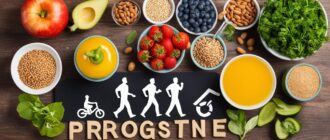The information provided in this article is intended for educational purposes only and should not be construed as medical advice. Although the author is a medical professional, the information presented here does not establish a doctor-patient relationship. Always consult with a qualified healthcare provider before making any decisions about your health or treatmentWelcome to our comprehensive guide on how to naturally increase prolactin levels for breast growth. Prolactin is a hormone that plays a crucial role in lactation and breast development. Understanding how to optimize prolactin production can have a positive impact on enhancing your breast size. In this article, we will explore various natural strategies and techniques to increase prolactin levels, including physical breast stimulation methods, managing stress, and making dietary modifications. Let’s dive in!
Contents
- 1 Understanding Prolactin and Its Role in Breast Growth
- 2 Strategies for Natural Prolactin Enhancement
- 3 Effective Techniques to Stimulate Prolactin Release
- 4 Nutrition’s Role in Prolactin Production
- 5 Herbal Supplements for Increasing Prolactin Levels
- 6 Benefits of Fenugreek for Enhancing Breast Milk Production
- 7 How to Increase Prolactin for Breast Growth
- 8 Lifestyle Changes to Promote Prolactin Production
- 9 Holistic Methods for Enhancing Breast Size
- 10 The Impact of Pharmaceutical Agents on Prolactin and Breast Growth
- 11 Managing Medications that Influence Prolactin Levels
- 12 Tracking and Adjusting Prolactin Levels Over Time
- 13 Seeking Professional Advice for Prolactin-Related Concerns
- 14 Conclusion
- 15 Source Links
Key Takeaways:
- Increasing your prolactin levels can promote breast growth naturally.
- Physical breast stimulation methods, such as breastfeeding and massage, can help boost prolactin production.
- Managing stress through relaxation techniques and self-care practices is essential for optimizing prolactin levels.
- Including foods like oats, quinoa, and sesame in your diet can support prolactin production.
- Herbal supplements like fenugreek, moringa, and shatavari may also enhance prolactin levels.
Understanding Prolactin and Its Role in Breast Growth
Prolactin is an essential hormone that plays a crucial role in both lactation and breast development. During pregnancy, prolactin levels rise, stimulating the mammary glands to prepare for milk production. After childbirth, prolactin continues to be produced, promoting the production of breast milk and supporting breastfeeding. The relationship between prolactin and breast growth is closely intertwined. Prolactin helps to stimulate the development and enlargement of the mammary glands, leading to an increase in breast size. Understanding the role of prolactin in breast growth is key to optimizing its production and harnessing its potential benefits.The Importance of Prolactin for Lactation and Breast Development
Prolactin is primarily responsible for lactation, which is the production and secretion of breast milk. It works in conjunction with other hormones, such as estrogen and progesterone, to ensure the successful initiation and continuation of breastfeeding. Prolactin stimulates the alveolar cells in the mammary glands to produce milk, while also enhancing the blood flow to these glands to support milk production. Breast development, or mammary gland growth, is also influenced by the actions of prolactin. Prolactin promotes the proliferation and differentiation of mammary epithelial cells, leading to an increase in the size and complexity of the mammary glands. This growth is essential for the mammary glands to effectively produce and store milk for lactation.How Prolactin Production is Regulated in the Body
Prolactin production is regulated by a complex interplay of hormones in the body. The primary control center for prolactin production is the pituitary gland, a small gland located at the base of the brain. The hypothalamus, a region of the brain, produces two key hormones: dopamine and thyrotropin-releasing hormone (TRH). Dopamine acts as a prolactin inhibitory factor, suppressing prolactin release from the pituitary gland. TRH, on the other hand, stimulates prolactin release. The delicate balance between dopamine and TRH determines the overall level of circulating prolactin in the bloodstream. Various factors can influence the regulation of prolactin production. Stress, sleep patterns, exercise, and certain medications can all have an impact on prolactin levels. Maintaining a healthy lifestyle, managing stress, and consulting with healthcare professionals when necessary can help ensure optimal prolactin production for breast growth.Strategies for Natural Prolactin Enhancement
In this section, we will explore various strategies and techniques for naturally enhancing prolactin production. By implementing lifestyle changes, making dietary modifications, and incorporating herbal supplements, you can stimulate prolactin release and promote the growth and development of breast tissue. These natural strategies aim to create an optimal hormonal balance in the body, supporting prolactin production and enhancing breast growth. To begin, let’s discuss the importance of lifestyle changes. Creating a healthy and balanced lifestyle plays a crucial role in promoting prolactin production. Ensure you prioritize adequate sleep, manage stress levels effectively, and engage in regular exercise. These lifestyle modifications can help support hormonal balance and contribute to the natural enhancement of prolactin levels. Your diet also plays a significant role in regulating prolactin production. Incorporating certain foods can aid in increasing prolactin levels naturally. Try to include foods such as oats, quinoa, and sesame seeds, as they are known to boost prolactin production. These foods provide essential nutrients and promote overall hormonal health, which can positively impact breast growth. In addition to lifestyle and dietary changes, herbal supplements can be utilized to stimulate prolactin production. Herbs like fenugreek, moringa, and shatavari have traditionally been used to enhance breast growth by naturally increasing the release of prolactin. It’s important to note that herbal supplements should be used with caution and under the guidance of a healthcare professional. By incorporating these strategies into your daily routine, you can promote natural prolactin enhancement and support breast growth. However, it’s crucial to remember that individual results may vary. Consult with a healthcare professional for personalized advice and supervision, especially if you have any specific health concerns or conditions.Effective Techniques to Stimulate Prolactin Release
In order to promote breast growth, it is important to stimulate the release of prolactin, a hormone that plays a vital role in lactation and breast development. In this section, we will explore effective techniques for stimulating prolactin release, including physical breast stimulation methods and stress management.Physical Breast Stimulation Methods
Physical breast stimulation can be a powerful way to increase prolactin levels naturally. Here are some techniques that can be incorporated into your routine:- Breastfeeding: Nursing stimulates the nipple and areola, triggering the release of prolactin. The more frequently you breastfeed, the more prolactin your body will produce.
- Pumping: Regularly using a breast pump can mimic the effects of breastfeeding and stimulate prolactin release. It is recommended to follow a pumping schedule that aligns with your baby’s feeding routine.
- Breast Massage: Massaging the breasts can help increase blood flow and stimulate prolactin production. Use gentle, circular motions, starting from the outside and working towards the nipple.
Managing Stress and Its Impact on Prolactin Levels
Stress can have a negative impact on prolactin production. When the body is under stress, it releases cortisol, which can inhibit the release of prolactin. Here are some strategies for managing stress:- Relaxation Techniques: Explore techniques such as deep breathing, meditation, and yoga to relax the body and reduce stress levels.
- Exercise: Regular physical activity helps reduce stress and promotes overall well-being. Find activities that you enjoy and incorporate them into your daily routine.
- Self-Care: Prioritize self-care activities that help you relax and unwind, such as taking warm baths, practicing mindfulness, or engaging in hobbies.
Nutrition’s Role in Prolactin Production
In this section, we will explore the role of nutrition in prolactin production and breast growth. A well-balanced diet plays a crucial role in regulating hormonal balance and optimizing prolactin levels. By incorporating specific foods into your diet, you can support lactation and promote healthy breast development.Foods That Boost Prolactin: Oats, Quinoa, and Sesame
Certain foods have been found to have a positive effect on prolactin production. Including these foods in your diet can help stimulate the release of this important hormone. Oats, quinoa, and sesame are three examples of foods known to boost prolactin levels.| Foods | Benefits |
|---|---|
| Oats | Oats contain phytoestrogens that can help stimulate prolactin production. They are also rich in fiber, which supports overall hormonal balance. |
| Quinoa | Quinoa is a complete protein source that provides essential amino acids necessary for hormone synthesis, including prolactin. |
| Sesame | Sesame seeds are high in essential fatty acids and plant compounds that promote hormone production, including prolactin. |
Balancing Macronutrient Intake for Hormone Health
A well-balanced macronutrient intake is essential for hormone health and optimal prolactin production. Ensure that your meals include a balance of carbohydrates, proteins, and fats.- Carbohydrates: Choose complex carbohydrates like whole grains, fruits, and vegetables, which provide sustained energy and essential nutrients for hormone synthesis.
- Proteins: Include lean proteins such as poultry, fish, legumes, and tofu, which provide the building blocks for hormone production.
- Fats: Incorporate healthy fats from sources like avocados, nuts, seeds, and olive oil, which are essential for hormone synthesis and regulation.
Herbal Supplements for Increasing Prolactin Levels
In the quest for enhancing breast growth, herbal supplements can play a significant role in increasing prolactin levels naturally. These supplements offer a natural and holistic approach to stimulate the production of prolactin, a key hormone involved in breast development and lactation. However, it is crucial to use herbal supplements with caution and under the guidance of a healthcare professional. There are several herbal remedies that have been traditionally used to boost prolactin levels and promote breast growth. Three notable examples include:- Fenugreek: Fenugreek is a widely recognized herb known for its potential to enhance breast size and stimulate milk production. It contains compounds that may mimic estrogen, a hormone that contributes to breast development.
- Moringa: Moringa is a nutrient-dense herb that has been used for centuries to promote overall health and wellness. It contains essential amino acids, vitamins, and minerals that can support hormonal balance and potentially increase prolactin levels.
- Shatavari: Shatavari, also known as Asparagus racemosus, is an Ayurvedic herb commonly used to support female reproductive health. It is believed to have adaptogenic properties, assisting the body in adapting to stress and potentially regulating prolactin production.
Tip: Herbal supplements may interact with medications or have side effects. Always consult with a healthcare professional before starting any new supplement regimen.
| Herbal Supplement | Potential Benefits | Potential Side Effects |
|---|---|---|
| Fenugreek | Enhances breast growth, stimulates milk production | May cause digestive issues, allergic reactions |
| Moringa | Nourishes the body with essential nutrients, promotes hormonal balance | May interact with certain medications, gastrointestinal discomfort |
| Shatavari | Potential adaptogenic properties, supports female reproductive health | May cause mild digestive issues, allergic reactions |
Benefits of Fenugreek for Enhancing Breast Milk Production
In this section, we will specifically explore the benefits of fenugreek for enhancing breast milk production. Fenugreek, a popular herb in traditional medicine, is known for its potential to increase milk supply in lactating women. Numerous studies have been conducted to examine the effectiveness of fenugreek in promoting breast milk production, and the results are promising.Understanding the Effectiveness of Fenugreek
Research has shown that fenugreek can stimulate the production of prolactin, the hormone responsible for lactation and breast milk production. Fenugreek contains compounds such as diosgenin and saponins, which are believed to mimic the action of estrogen and stimulate milk production.Safe Usage and Potential Side Effects of Fenugreek
Fenugreek is generally considered safe for most women when consumed in moderate amounts. However, it is important to use fenugreek responsibly and consult with a healthcare professional before incorporating it into your routine, especially if you have any underlying medical conditions or are taking other medications. While fenugreek is generally well-tolerated, some women may experience mild side effects such as digestive discomfort, bloating, or gas. It is recommended to start with a low dose and gradually increase to assess tolerance and minimize the risk of side effects. It is worth noting that fenugreek may interact with certain medications, such as blood thinners or diabetes medications, so it is important to seek professional advice if you are currently taking any medications. In conclusion, fenugreek has shown potential benefits for enhancing breast milk production. However, it is crucial to use fenugreek responsibly, follow recommended dosages, and consult with a healthcare professional to ensure safety and effectiveness.How to Increase Prolactin for Breast Growth
In this section, we will provide practical tips and methods to increase prolactin levels for breast growth. By implementing various strategies, including lifestyle changes, dietary modifications, and supplements, you can optimize prolactin production and promote enhanced breast size.- Engage in regular breast stimulation activities, such as massage or gentle suction, to activate prolactin release.
- Manage stress levels through relaxation techniques like deep breathing, meditation, and yoga. Chronic stress can inhibit prolactin production.
- Ensure you are getting adequate sleep to support optimal hormone production, including prolactin.
- Consume foods known to boost prolactin levels, such as oats, quinoa, and sesame seeds.
- Consider natural supplements like fenugreek, moringa, and shatavari, which have been traditionally used to enhance prolactin production.
- Seek guidance from a healthcare professional or lactation consultant to tailor a plan that suits your needs and goals.
Example table:
| Methods to Increase Prolactin | Benefits |
|---|---|
| Breast stimulation | Activates prolactin release and promotes breast growth |
| Stress management | Reduces cortisol levels, allowing for optimal prolactin production |
| Adequate sleep | Supports hormone production, including prolactin |
| Proper nutrition | Consuming foods known to boost prolactin levels |
| Natural supplements | Herbs that stimulate prolactin production |
| Professional guidance | Consultation with healthcare professionals or lactation consultants for personalized support |
Lifestyle Changes to Promote Prolactin Production
In addition to dietary modifications and herbal supplements, making lifestyle changes can play a significant role in promoting prolactin production and enhancing breast growth. By optimizing hormonal balance through lifestyle modifications, individuals can support the natural processes that contribute to breast development. Let’s explore some key lifestyle changes that can help promote prolactin production:- Adequate sleep: Getting enough sleep is crucial for overall hormonal balance and can support prolactin production. Aim for 7-9 hours of quality sleep each night to optimize your body’s natural hormone levels.
- Stress management: High levels of stress can disrupt hormonal balance and potentially inhibit prolactin production. Implement stress management techniques such as meditation, yoga, deep breathing exercises, or engaging in hobbies you enjoy.
- Regular exercise: Engaging in regular physical activity can help regulate hormone levels and promote optimal prolactin production. Aim for a combination of cardiovascular exercises, strength training, and activities that focus on core and chest muscles.
- Healthy diet: A balanced diet with a variety of nutrient-rich foods can support hormonal balance and contribute to breast growth. Incorporate foods that are high in vitamins, minerals, and phytoestrogens, such as fruits, vegetables, whole grains, legumes, and lean proteins.
| Lifestyle Changes | Benefits |
|---|---|
| Adequate sleep | Promotes hormonal balance and supports prolactin production. |
| Stress management | Reduces the negative impact of stress on hormonal balance and prolactin synthesis. |
| Regular exercise | Regulates hormone levels and promotes optimal prolactin production. |
| Healthy diet | Provides necessary nutrients for hormonal balance and supports breast growth. |

Holistic Methods for Enhancing Breast Size
In our quest for natural breast enhancement, holistic methods play a vital role. These approaches focus on the mind-body connection and leverage the interplay between hormonal balance, sleep, exercise, and prolactin levels. By incorporating holistic practices into your routine, you can optimize breast growth and overall well-being.Incorporating Mind-Body Practices for Hormonal Balance
Mind-body practices, such as meditation and yoga, have been shown to have a positive impact on hormonal balance. These practices promote relaxation, reduce stress, and regulate hormone production, including prolactin. By incorporating meditation or yoga into your daily routine, you can support hormonal balance and encourage breast growth.The Interplay Between Sleep, Exercise, and Prolactin Levels
Sleep and exercise also play crucial roles in prolactin production and breast development. Getting adequate sleep promotes hormone regulation and allows the body to produce optimal levels of prolactin. Regular exercise, particularly activities that engage the chest muscles, can stimulate prolactin release and contribute to breast growth. By prioritizing quality sleep and incorporating exercises that target the chest area, you can enhance breast size naturally. Remember, consistency is key in achieving optimal results. Consult with a healthcare professional or certified trainer to develop a customized sleep and exercise plan that suits your needs.The Impact of Pharmaceutical Agents on Prolactin and Breast Growth
Pharmaceutical agents can have a significant impact on prolactin levels and breast growth. Certain medications, such as dopamine agonists and antipsychotics, have been found to influence prolactin production in the body. It is important to be aware of the potential effects of these medications and consult with a healthcare professional if any concerns arise. In some cases, pharmaceutical agents that affect prolactin levels can lead to changes in breast tissue. These changes can include an increase or decrease in breast size or milk production. Understanding how medications can impact prolactin levels is crucial for individuals who are considering or currently taking these medications.Managing Medications that Influence Prolactin Levels
In the management of prolactin levels, it is essential to consider the influence of medications. Certain drugs can impact prolactin production, either by increasing or decreasing it. It is crucial to manage these medications effectively to ensure optimal prolactin levels for breast growth.Consulting Healthcare Professionals for Medication Adjustments
When taking medications that affect prolactin levels, it is highly recommended to consult with a healthcare professional. They can assess your medication regimen and make necessary adjustments to ensure it aligns with your goals of promoting breast growth. Healthcare professionals have the expertise to monitor medication interactions and provide guidance on dosage, timing, and potential side effects.Recognizing Drugs That May Decrease Prolactin
It is important to be aware of drugs that have the potential to lower prolactin levels. Some medications, such as dopamine agonists and antipsychotics, can inhibit prolactin production. If you are taking these medications and want to enhance prolactin for breast growth, it is crucial to recognize their potential effects and discuss alternatives with your healthcare professional.Tracking and Adjusting Prolactin Levels Over Time
This section emphasizes the importance of monitoring and adjusting prolactin levels to promote breast growth. By actively tracking hormonal changes and working with healthcare professionals, individuals can optimize prolactin production and achieve desired breast development. One effective method for monitoring prolactin levels is through hormone testing. Regular tests allow individuals to assess their current prolactin levels and identify any fluctuations or abnormalities that may impact breast growth. Healthcare professionals can interpret these test results and provide recommendations for adjusting prolactin levels. Working closely with healthcare professionals is key to making necessary adjustments to optimize prolactin production. They can provide personalized guidance based on individual needs and goals. Whether through lifestyle modifications, dietary changes, or prescribed medications, healthcare professionals can help individuals find the most suitable approach for adjusting prolactin levels. Understanding the fluctuations in prolactin levels over time is essential in achieving desired breast development. By closely monitoring and making necessary adjustments, individuals can maximize the potential of their body’s natural hormonal balance for breast growth.Seeking Professional Advice for Prolactin-Related Concerns
In the journey to enhance prolactin levels for breast growth, it is crucial to seek professional advice for any concerns related to prolactin. Consulting with healthcare professionals, such as lactation consultants, can provide valuable guidance and personalized support tailored to your specific needs.Working with a Lactation Consultant for Personalized Support
A lactation consultant is a trained professional who specializes in breastfeeding and lactation. They possess extensive knowledge and expertise in understanding prolactin’s role in lactation and breast development, making them an ideal resource for personalized support. Working with a lactation consultant can help you navigate the complexities of prolactin enhancement and provide tailored advice to optimize your breast growth journey. In partnership with a lactation consultant, you can expect:- Individualized assessments of your prolactin levels and breast development goals
- Strategies to stimulate prolactin production through techniques like physical breast stimulation
- Educational resources on nutrition, herbal supplements, and holistic methods for breast growth
- Guidance on monitoring and adjusting prolactin levels over time
- Support in managing medications that influence prolactin production
Risks of Self-Medicating and Importance of Supervision
While there are various methods and supplements available to enhance prolactin levels, it is important to recognize the risks associated with self-medicating. Self-administering medications or herbal supplements without proper supervision can lead to unintended side effects and potentially harm your health. Supervision from healthcare professionals, including lactation consultants and doctors, is crucial to ensure safe and effective prolactin enhancement. They have the expertise to evaluate your individual health status, analyze potential risks, and provide appropriate guidance. Seeking professional advice and working with a healthcare team will help ensure that your prolactin enhancement journey is well-informed, supportive, and prioritizes your overall well-being.Conclusion
In conclusion, increasing prolactin levels naturally can be a valuable strategy for promoting breast growth. Throughout this article, we have explored various methods and techniques to enhance prolactin production. By understanding the role of prolactin in lactation and breast development, we can implement strategies for natural prolactin enhancement. One effective way to stimulate prolactin release is through physical breast stimulation methods like breastfeeding, pumping, and massage. Additionally, managing stress levels can play a crucial role in optimizing prolactin production. A balanced diet that includes foods such as oats, quinoa, and sesame can also help boost prolactin levels. Furthermore, herbal supplements like fenugreek, moringa, and shatavari have been traditionally used to increase prolactin levels. However, it is essential to use these supplements with caution and under the guidance of a healthcare professional. While these natural methods show promise in enhancing prolactin levels and promoting breast growth, it is important to remember that individual results may vary. Consulting with healthcare professionals can provide personalized advice and supervision to ensure the best approach for achieving desired outcomes.Source Links
- https://www.wikihow.com/Increase-Prolactin
- https://getboober.com/the-ultimate-guide-to-foods-that-increase-breast-milk-production-aka-galactagogues/
- https://pubmed.ncbi.nlm.nih.gov/1095275/
This is where the doctor will answer all your questions
Dr. Ethan Walker stands out as a highly adept and seasoned plastic surgeon, focusing on breast augmentation and lift procedures. With a robust 15-year background in breast surgery, he has positioned himself as a foremost authority in the field. Dr. Walker's commitment to precision and his artistic approach have cemented his reputation as one of the premier plastic surgeons for achieving natural and aesthetically pleasing results in breast augmentation and lifts.
Educational Background and Credentials:
-Medical Degree: Duke University School of Medicine
-Plastic Surgery Residency: University of Pittsburgh Medical Center
-Aesthetic Surgery Fellowship: Cleveland Clinic
-Board Certification: American Board of Plastic Surgery
-Memberships: American Society of Plastic Surgeons (ASPS), American College of Surgeons (ACS)
Educational Background and Credentials:
-Medical Degree: Duke University School of Medicine
-Plastic Surgery Residency: University of Pittsburgh Medical Center
-Aesthetic Surgery Fellowship: Cleveland Clinic
-Board Certification: American Board of Plastic Surgery
-Memberships: American Society of Plastic Surgeons (ASPS), American College of Surgeons (ACS)
Questions to the expert
How can I naturally increase my prolactin levels for breast growth?
What is the role of prolactin in breast growth and lactation?
How is prolactin production regulated in the body?
What physical breast stimulation methods can help increase prolactin levels?
How does stress impact prolactin levels?
Are there specific foods that can boost prolactin levels?
Are there herbal supplements that can increase prolactin levels?
How effective is fenugreek for enhancing breast milk production?
What are some tips for increasing prolactin levels for breast growth?
How can lifestyle changes promote prolactin production and enhance breast growth?
Are there holistic methods for enhancing breast size?
Can medication affect prolactin levels and breast growth?
How should I manage medications that influence prolactin levels?
Is it necessary to track and adjust prolactin levels over time for breast growth?
Why is it important to seek professional advice for prolactin-related concerns?
Seeking professional advice, such as consulting with a lactation consultant, can provide personalized support and guidance tailored to your specific needs. It can also help you avoid the risks associated with self-medication and ensure the safety and effectiveness of your prolactin enhancement methods.
What is the conclusion on increasing prolactin for breast growth?
In conclusion, increasing prolactin levels naturally for breast growth involves various strategies, including physical breast stimulation, managing stress, making dietary modifications, and incorporating herbal supplements. Individual results may vary, so it is important to consult with healthcare professionals for personalized advice and supervision.
The information provided on this page about breast augmentation surgical procedures is intended for informational purposes only. It is not intended to be a substitute for professional medical advice, diagnosis, or treatment. Always consult with a qualified healthcare professional for personalized advice and guidance on breast augmentation.Risks and Complications:
Breast augmentation surgery is a major surgical procedure with potential risks and complications. These risks include infection, bleeding, scarring, implant rupture, and changes in breast sensation. It is important to discuss these risks with your doctor before making a decision about breast augmentation surgery.Consult a Qualified Medical Professional:
If you are considering breast augmentation surgery, it is important to consult with a qualified medical professional. A qualified plastic surgeon can provide you with personalized advice and guidance on the risks, benefits, and alternatives to breast augmentation surgery. They can also help you choose the right type of breast implant and surgical technique for your individual needs and goals.








